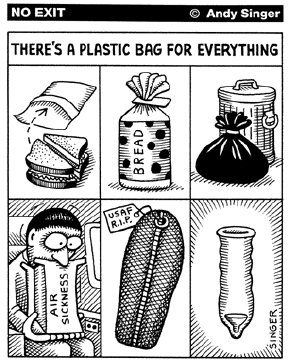|
| |
Another reason for a War
on Plastic: additive deca-BDE
The following summary is from the East Bay Express
(Emeryville, California), February 16, 2005. (permission granted)Polybrominated diphenyl ethers (PBDE family) are flame retardants
that behave in rats like PCBs do, and are all over the environment, the way
DDT ended up in the Arctic. Two kinds of PBDE were banned but a third
type, deca-BDE, was excluded from regulations -- "a grave error,"
according to a new feature story in the East Bay Express weekly
newspaper. The following continues Culture Change's summary of the
article:
PBDEs including deca-BDE is in breast milk. Exposures early in life can alter reproductive
structures, lower sperm count, delay puberty, and damage the ovaries.
Five percent of the population has quite high PDBE levels, "a margin of safety
that is pretty low," according to the California EPA's Office of
Environmental Health Hazard Assessment.
Deca is made worldwide to the tune of 125 million pounds every year, as
"...an additive to high-impact polystyrene plastics used in a wide
variety of products: hair dryers, toasters, curling irons, coffeemakers, TVs,
computer casings, printers, fax machines, smoke detectors, and light fixtures.
It is used in very large amounts -- up to 15 percent of the plastic by weight.
It is also added to backing in textiles for drapes, furniture, and rugs, and
to some polyurethane foams."
A Calif. Dept. of Toxic Substances Control researcher, Dr. Kim Hooper, says
"The myth was that it is stable, doesn't degrade, doesn't disperse, stays
in sediment or products, is not metabolized, and is not taken up by
biota." Deca is nearly everything it was assumed not to be. Its
widespread use means an enormous reservoir of the chemical accumulates
indoors, where people spend more than 80 percent of their time. It has
been found at significant levels in household dust, in the film on the inside
of windows, and in office air. Like deca's banned counterparts penta and
octa, and PCBs, it now also
appears to cause neurodevelopmental damage in animals. Deca goes through
the body rapidly, but may be broken down by sunlight into smaller molecules
including its toxic, banned family members.
Dr. Hooper: "The final reality is that we have more than a half-billion
pounds of the stuff above ground in consumer products in close human contact,
and another half-billion below ground in sediment. This billion pounds
eventually breaks down; into what, we don't know."
The East Bay Express's Andy Isaacson, author of the article, said "As the foam in sofa cushions breaks down in landfills over time, for
example, the released PBDEs get carried by the wind and are deposited far and
wide -- the "grasshopper effect." The toxins ultimately work
their way up the food chain to accumulate in humans and predatory
animals."
The Environmental Working Group studies PBDEs in dust and breast milk, says
"we're finding chemicals in everyday household products -- furniture,
Teflon pans, cosmetics -- to be very dangerous."
____________________
The East Bay Express is the source of the above in "The Gorilla In The
Closet" on deca-BDE. I told the magazine that "Plastics is the
papa gorilla."
As alarming as the story in the East Bay Express is, it contains no conclusion
along the lines that we should not be buying or using the consumer junk that
people think they need. However, East Bay Express did point people
to the Environmental Working Group (link below) which has suggested ways to
lower your PDBE exposure; "...it was a space issue," East Bay
Express told Culture Change.
- Jan Lundberg
See www.ewg.org/reports/inthedust
and the full story from East Bay Express:
http://eastbayexpress.com/issues/2005-02-16/cityside.html
*****
Other links
War
on Plastics by Jan Lundberg
Plastics: Your formidable enemy by Jan Lundberg
www.ourstolenfuture.org
Plastic
Oceans news article.
Algalita Marine Research
Foundation, maker of the movie, "Our
Synthetic Sea" available for purchase.
Earth Resource Foundation's "Sea
Turtles Don't Shop" anti-plastic bag campaign.
Paul Goettlich's Get
Plastic Out of Your Diet
and his
PVC:
A Health Hazard From Production through Disposal
Scientific American article on "green
plastics"
Sustainable business: reuseablebags.com
Scripps Howard plastics
article in Seattle daily newspaper.
"Paper
or plastic?"
Why the kill-for-oil culture will collapse and die.
Trash society, trash fashion, trash
worship.
"Plastic disaster is creeping on me..." - the Depavers
song Green is the Shelter
Funding link below for CAPP:
Donate to
the Campaign Against the Plastics Plague (tax
deductible; sponsored by the Earth
Resource Foundation) to help us help you and the countless creatures harmed by
petroleum/plastics. Thank you.
To support Culture
Change/Sustainable Energy Institute and its projects, make a
tax-deductible donation.

For another Singer masterpiece, go to above
article's Singer bookmark
| |
|